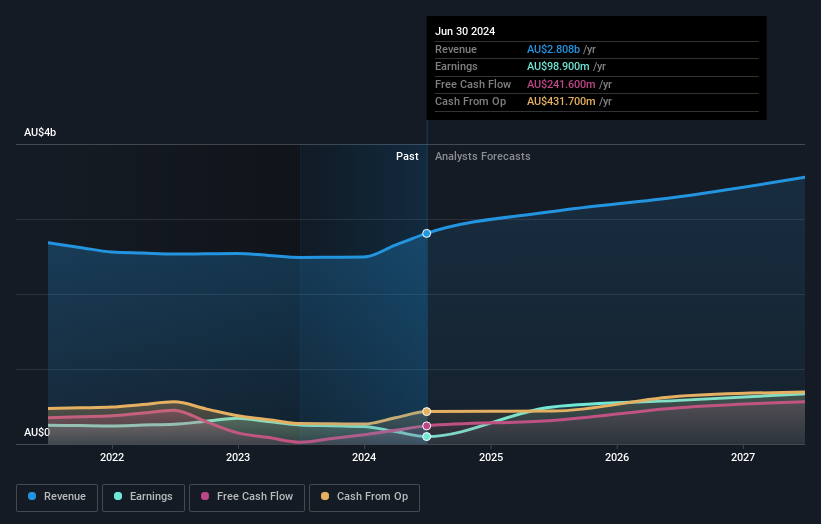Treasury Wine Estates Limited's (ASX:TWE) market cap dropped AU$357m last week; individual investors who hold 60% were hit as were institutions

Key Insights
- The considerable ownership by individual investors in Treasury Wine Estates indicates that they collectively have a greater say in management and business strategy
- A total of 25 investors have a majority stake in the company with 37% ownership
- Institutional ownership in Treasury Wine Estates is 39%
Every investor in Treasury Wine Estates Limited (ASX:TWE) should be aware of the most powerful shareholder groups. And the group that holds the biggest piece of the pie are individual investors with 60% ownership. In other words, the group stands to gain the most (or lose the most) from their investment into the company.
While institutions who own 39% came under pressure after market cap dropped to AU$8.8b last week,individual investors took the most losses.
Let's take a closer look to see what the different types of shareholders can tell us about Treasury Wine Estates.
View our latest analysis for Treasury Wine Estates

What Does The Institutional Ownership Tell Us About Treasury Wine Estates?
Institutional investors commonly compare their own returns to the returns of a commonly followed index. So they generally do consider buying larger companies that are included in the relevant benchmark index.
We can see that Treasury Wine Estates does have institutional investors; and they hold a good portion of the company's stock. This suggests some credibility amongst professional investors. But we can't rely on that fact alone since institutions make bad investments sometimes, just like everyone does. When multiple institutions own a stock, there's always a risk that they are in a 'crowded trade'. When such a trade goes wrong, multiple parties may compete to sell stock fast. This risk is higher in a company without a history of growth. You can see Treasury Wine Estates' historic earnings and revenue below, but keep in mind there's always more to the story.

We note that hedge funds don't have a meaningful investment in Treasury Wine Estates. State Street Global Advisors, Inc. is currently the largest shareholder, with 8.5% of shares outstanding. Meanwhile, the second and third largest shareholders, hold 5.3% and 4.8%, of the shares outstanding, respectively.
Our studies suggest that the top 25 shareholders collectively control less than half of the company's shares, meaning that the company's shares are widely disseminated and there is no dominant shareholder.
While studying institutional ownership for a company can add value to your research, it is also a good practice to research analyst recommendations to get a deeper understand of a stock's expected performance. Quite a few analysts cover the stock, so you could look into forecast growth quite easily.
Insider Ownership Of Treasury Wine Estates
While the precise definition of an insider can be subjective, almost everyone considers board members to be insiders. The company management answer to the board and the latter should represent the interests of shareholders. Notably, sometimes top-level managers are on the board themselves.
Insider ownership is positive when it signals leadership are thinking like the true owners of the company. However, high insider ownership can also give immense power to a small group within the company. This can be negative in some circumstances.
Our information suggests that Treasury Wine Estates Limited insiders own under 1% of the company. However, it's possible that insiders might have an indirect interest through a more complex structure. It is a pretty big company, so it would be possible for board members to own a meaningful interest in the company, without owning much of a proportional interest. In this case, they own around AU$10m worth of shares (at current prices). It is always good to see at least some insider ownership, but it might be worth checking if those insiders have been selling.
General Public Ownership
The general public, mostly comprising of individual investors, collectively holds 60% of Treasury Wine Estates shares. This size of ownership gives investors from the general public some collective power. They can and probably do influence decisions on executive compensation, dividend policies and proposed business acquisitions.
Next Steps:
I find it very interesting to look at who exactly owns a company. But to truly gain insight, we need to consider other information, too. Take risks for example - Treasury Wine Estates has 2 warning signs (and 1 which is concerning) we think you should know about.
If you would prefer discover what analysts are predicting in terms of future growth, do not miss this free report on analyst forecasts.
NB: Figures in this article are calculated using data from the last twelve months, which refer to the 12-month period ending on the last date of the month the financial statement is dated. This may not be consistent with full year annual report figures.
Valuation is complex, but we're here to simplify it.
Discover if Treasury Wine Estates might be undervalued or overvalued with our detailed analysis, featuring fair value estimates, potential risks, dividends, insider trades, and its financial condition.
Access Free AnalysisHave feedback on this article? Concerned about the content? Get in touch with us directly. Alternatively, email editorial-team (at) simplywallst.com.
This article by Simply Wall St is general in nature. We provide commentary based on historical data and analyst forecasts only using an unbiased methodology and our articles are not intended to be financial advice. It does not constitute a recommendation to buy or sell any stock, and does not take account of your objectives, or your financial situation. We aim to bring you long-term focused analysis driven by fundamental data. Note that our analysis may not factor in the latest price-sensitive company announcements or qualitative material. Simply Wall St has no position in any stocks mentioned.
About ASX:TWE
Treasury Wine Estates
Operates as a wine company primarily in Australia, the United States, the United Kingdom, and internationally.
Reasonable growth potential and fair value.
Similar Companies
Market Insights
Community Narratives




